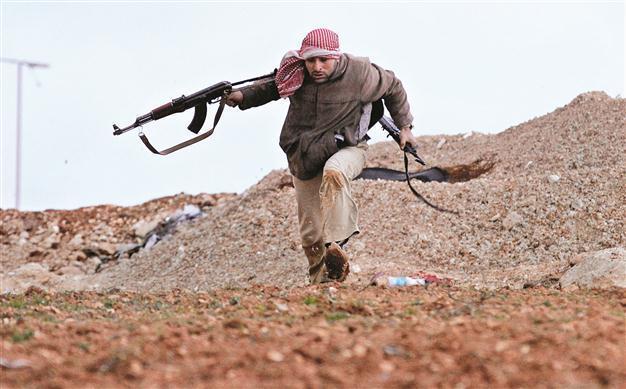Moscow, Ankara to keep up Syria talks
ANKARA - Hürriyet Daily News

A Syrian rebel runs for cover during an exchange of fire with army troops, unseen, in Idlib on Feb 8. AP photo
Turkey and
Russia have agreed to keep up dialogue on the Syrian crisis despite Ankara’s fury at Moscow’s veto of a U.N. Security Council resolution and efforts for a new international platform.
Prime Minister Recep Tayyip Erdoğan and Russian President Dmitry Medvedev agreed in a telephone call on Feb. 8 that their foreign ministers would remain in touch and have further contact and discussions on the issue, a prime ministry official told the Hürriyet Daily News.
The parties hadn’t discussed the international conference on
Syria which Turkey proposed, but discussed general aspects of the Syrian crisis, the official said. Turkey announced that it plans an international meeting to agree ways to end the killing in Syria.
Erdoğan said in the conversation that the current Syrian administration completely lost its persuasiveness and legitimacy, citing the killings kept up by the Syrian regime. He expressed his sorrow as the United Nations Security Council couldn’t reach a decision about Syria as well as the veto of a draft on the issue, and reminded every party should have conscientious responsibility on the killings in Syria, a prime ministry statement said.
Medvedev told Erdoğan that the search for a solution to the Syrian crisis should continue, including in the U.N. Security Council, but that foreign intervention was not an option, the Kremlin said.
Russian Foreign Minister Sergei Lavrov visited Syria Feb. 7 and said Moscow was prepared to work to end the crisis under an Arab League peace plan and that al-
Assad was ready for dialogue with all political forces.
Moscow demurs at ‘friends of Syria’
Meanwhile, Russia said yesterday it took a cautious view of U.S.-backed attempts to forge a “friends of Syria” coalition that may soon meet in Turkey to coordinate humanitarian assistance for the embattled opposition.
The Russian foreign ministry’s chief spokesman said the idea appeared similar to the grouping of like-minded nations that Washington forged in advance of an air campaign on Libya that Russia strongly opposed. “We take a generally cautious view of formats that we do not believe are legitimate for dealing with specific international disputes,” foreign ministry spokesman Alexander Lukashevich told a weekly briefing. “We have had very bad experience working in such formats, and take a cautious attitude to various contact groups and groups of friends,” said Lukashevich, Agence France-Presse reported.
He added that Russia remained opposed to any coalitions whose job was to “introduce foreign intervention” in another nation’s internal affairs.
war, massacre, Homs,
